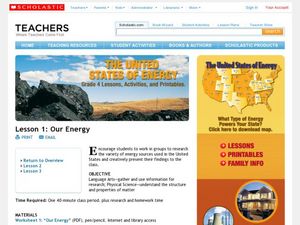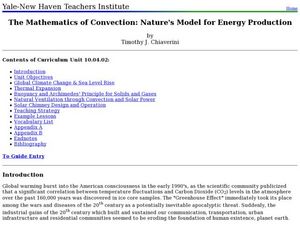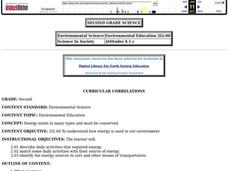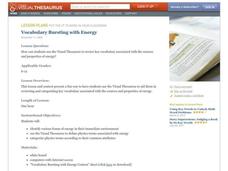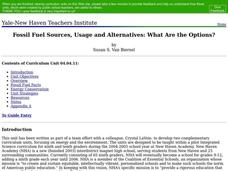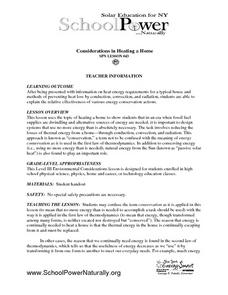Curated OER
Energy Activities
Students conduct a variety of experiments related to solar energy, heating, cooling, gravity, physical insulation and wind. They consider how the experiments relate to energy and the consumption of energy and then participate in a class...
Curated OER
Energy
In this energy worksheet, students complete a graphic organizer by fill in the different types of energy and the different forms of energy.
Curated OER
Measuring the Number Of Calories In Sunlight
Learners., in groups, define calorie and compare the absorption of solar energy by three different collectors. They define solar constant and offer several explanations for discrepancies between the data collected and the solar constant.
Curated OER
Get Charged!
Students explore the concept of electricity in this activity based unit. In this physical science lesson plan, students focus on electricity and electrical engineering. The teaching unit includes 5 activities to develop students...
Curated OER
Just Turn it Off
Learners explore energy. In this energy lesson, students discover why it is important to conserve energy. Learners discover how energy is used in items we use everyday. Students discover how batteries work. Learners do an experiment with...
Kenan Fellows
How Much Heat Can a Phase Change Produce?
Scholars learn about heat release in phase changes. They perform calculations as they compare and contrast a science fiction passage and a home heating application.
Science Geek
Basic Thermochemistry
Heat is more than just temperature, as viewers discover throughout a presentation about thermochemistry that emphasizes vocabulary. Definitions include joule, calorie, energy, enthalpy, calorimetry, exothermic and endothermic process,...
University of California
Hot! Hot! Hot!
Calories are not tiny creatures that sew your clothes tighter every night, but what are they? A science lesson, presented at multiple levels, has learners experiment with heat, heat transfer, and graph the function over time. It also...
American Chemical Society
Exothermic, Endothermic, and Chemical Change
Scientists can't observe bonds breaking or forming, so how do they distinguish between exothermic and endothermic reactions? Young scholars complete two experiments to do just that. They monitor temperature change and calculate the...
Museum of Science
Hot Air Balloon
It is more than just blowing hot air. Pupils first build a hot air balloon out of tissue paper by cutting enough panels of tissue paper to form a balloon shape and glue the panels together. Using a hot air gun, individuals then inflate...
University of Waikato
Solid to Liquid to Gas
Help classes understand heat as a form of energy. A hands-on activity has learners investigate how heat, or the lack of heat, affects the physical state of water. They then connect their discoveries to the water cycle.
Curated OER
Our Energy
Fifth graders research energy sources used in the United States. In this energy sources lesson, 5th graders work in teams to research various energy sources. Students complete a worksheet for the research and make a short video of a...
Pennsylvania Department of Education
Pennsylvania’s Energy Supply
Third graders become familiar with the various types of energy and which types are found in Pennsylvania. In this Pennsylvanian energy resources lesson, 3rd graders, identify wind and water as sources of energy. Students complete an...
University of Waikato
Māui and the Sun
Using a Maori legend, How Maui Tamed the Sun, youngsters are introduced to the importance of sunlight to civilization. Teach them about nuclear fusion that occurs to produce the solar energy we later receive on Earth as electromagnetic...
Texas State Energy Conservation Office
Power Systems & Efficiency
Are you looking for a reading resource about the efficiency of power systems? Here is one that introduces the output/input ratio, measurement of energy by joules or calories, and efficiency ratings. For STEM classes that are learning...
Curated OER
The Mathematics of Convection: Nature's Model for Energy Production
High schoolers conduct a series of experiments to investigate density, buoyancy and climate. In this math lesson, pupils design and build a hot air balloon to demonstrate convection. They research and write a paper about solar chimneys.
American Chemical Society
Energy Levels, Electrons, and Ionic Boding
Learners see how electrons are transferred in the bonding of NaCl. They then create models of NaCl using styrofoam balls and toothpicks to assist them in explaining the formation of ions and ionic bonding.
Curated OER
Environmental Education
Second graders discuss the different forms of energy and their sources. They work with a partner to answer a variety of questions revolving around energy. They develop a scientific attitude about renewable energy.
Curated OER
Vocabulary Bursting with Energy
Students review key physics terms using a Visual Thesaurus. In this science lesson, student groups compete against each other to correctly identify "imposter" words from a list of related physics vocabulary terms.
Curated OER
Fossil Fuel Sources, Usage and Alternatives: What Are the Options?
Students examine the relationship between energy and the environment. In groups, they participate in experiments to discover the law of thermodynamics and the differences between potential, kinetic and mechanical forms of energy. They...
Curated OER
Lemon Batteries Revised
Fifth graders investigate how chemical energy in food and batteries is potential or stored energy. They discuss how batteries function, and create a class list of different forms of energy. Students then create a lemon battery that...
Curated OER
Things That Glow: From Fireflies to Quantum Dots
Third graders observe light energy. In this heat and energy lesson, 3rd graders will study the concept of light as a form of energy. Students will examine the different forms of light and the type of energy it produces.
Curated OER
Shrinky Dinks® Palettes
Here is a fun and clever lesson for teaching physics classes how to calculate wavelength if given the energy and frequency data. On a worksheet, they compute wavelengths using a table of information that you provide. On a paper palette,...
Curated OER
Considerations in Heating a Home
Emerging engineers discover how important it is to conserve energy as fossil fuel supplies are being diminished. This is accomplished by working through a handout that explains energy requirements for heating a home during the winter....













